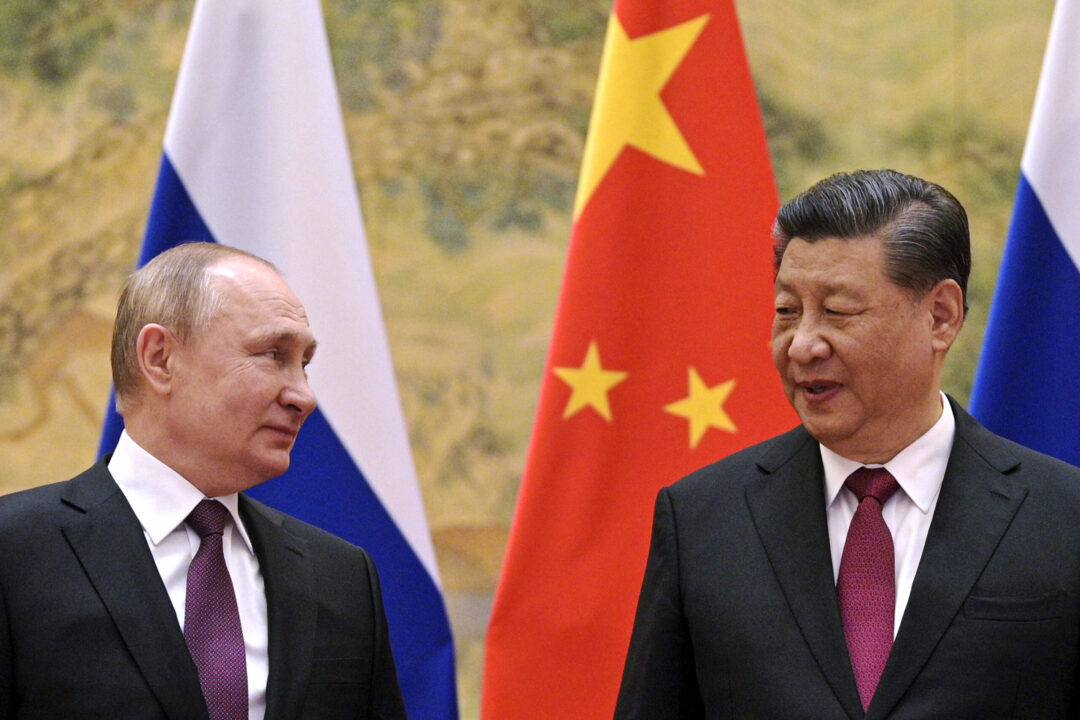China’s Xi to visit Putin amid Beijing’s bolder global role
KYIV, Ukraine (AP) — Chinese President Xi Jinping plans to visit Russia from Monday to Wednesday, an apparent show of support for Russian President Vladimir Putin amid sharpening East-West tensions over the war in Ukraine and the latest sign of Beijing’s emboldened diplomatic ambitions.
Russia’s ongoing invasion of Ukraine is expected to dominate Putin and Xi’s discussions. China has refused to condemn Moscow’s aggression and sought to project itself as neutral in the conflict even while Beijing declared last year that it had a “no-limits” friendship with Russia.
Both China and Russia announced Xi’s trip to Moscow on Friday. The visit offers a diplomatic shot in the arm for Putin as Western leaders have sought to isolate him over the war, which is now in its 13th month.
China’s refusal to condemn Russia while denouncing Western sanctions and accusing NATO and the United States of provoking Putin’s military action has irked Washington as it competes with Beijing for influence.
Kremlin spokesman Dmitry Peskov said that Putin and Xi would have a one-on-one meeting over an informal dinner Monday. Broader talks involving officials from both countries are scheduled for Tuesday. Peskov would not provide details about the discussions.
During the war in Ukraine, China has said the sovereignty and territorial integrity of all countries should be respected. However, it remains unclear whether its position is intended to position China as a neutral peacemaker or suggests Beijing sympathizes with Moscow’s claims to seized Ukrainian territory.
On Thursday, Chinese Foreign Minister Qin Gang reached out to his Ukrainian counterpart, Dmytro Kuleba, telling him that Beijing was concerned about the war spinning out of control and urging talks on a political solution with Moscow.
China has “always upheld an objective and fair stance on the Ukraine issue, has committed itself to promoting peace and advancing negotiations and calls on the international community to create conditions for peace talks,” Qin said.
Kuleba later tweeted that he and Qin “discussed the significance of the principle of territorial integrity.” Ukraine has listed Russia’s withdrawal from the occupied areas as the main condition for peace, and China has its own territorial integrity issues with Taiwan, which it claims as its own territory to be brought under its control by force if necessary.
“I underscored the importance of (Ukrainian President Volodymyr Zelenskyy’s)’s peace formula for ending the aggression and restoring just peace in Ukraine,” wrote Kuleba, who spoke the same day with U.S. Secretary of State Antony Blinken.
Beijing’s apparent deeper dive into Ukraine issues follows its success last week in brokering talks between Iran and its chief Middle Eastern rival, Saudi Arabia. Those two countries agreed to restore their diplomatic ties after years of tensions.
The agreement cast China in a leading role in Middle Eastern politics, a part previously reserved for longtime global heavyweights like the U.S.
On the back of that, Xi called for China to play a bigger role in managing global affairs.
Washington has marshaled Western military and diplomatic efforts against Putin, but the Russian leader has showed no signs of softening his belligerent stance.
The destruction of a U.S. drone over the Black Sea on Tuesday following an encounter with Russian fighter jets further escalated U.S.-Russia tensions, although it also prompted the first conversations between the countries’ defense and military chiefs since October.
China last month called for a Ukraine cease-fire and peace talks between Kyiv and Moscow. Zelenskyy cautiously welcomed Beijing’s involvement but the overture appeared to go no further.
Putin invited Xi to visit Russia during a video conference call the two held in late December. The visit, Putin said, could “demonstrate to the whole world the strength of the Russian-Chinese ties” and “become the main political event of the year in bilateral relations.”
Chinese Ministry of Foreign Affairs spokesperson Wang Wenbin said Friday that Xi “will have an in-depth exchange of views with President Putin on bilateral relations and major international and regional issues of common concern, promote strategic cooperation and practical cooperation between the two countries, and inject new impetus into the development of bilateral relations.”
“Currently, the world is entering a new period of turbulences and reform with the accelerated evolution of changes of the century. As permanent members of the U.N. Security Council and important major countries, the significance and impact of the China-Russia relations go far beyond the bilateral sphere,” he added.
The Kremlin on Friday also announced Xi’s visit, saying it would take place “at the invitation of Vladimir Putin.”
Xi and Putin will discuss “issues of further development of comprehensive partnership and strategic interaction between Russia and China,” as well as exchange views “in the context of deepening Russian-Chinese cooperation in the international arena,” the Kremlin said in a statement.
The two leaders will also sign “important bilateral documents,” the statement read.
